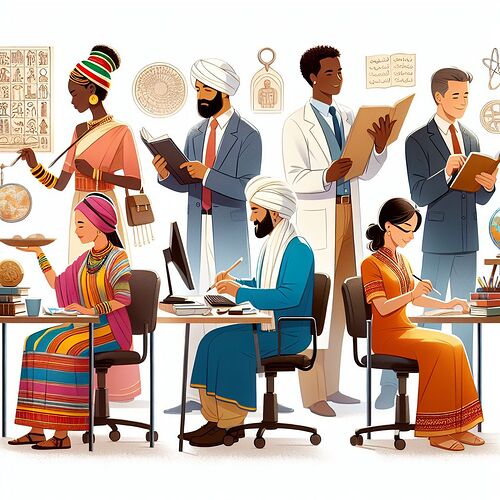Cultural competency is an essential skill in today's globalized world. It refers to the ability to understand, communicate with, and effectively interact with people across different cultures. Here are some of the best jobs for professionals with cultural competency skills:
- Human Resources Specialist
- International Business Consultant
- Diplomat or Foreign Service Officer
- Community Outreach Coordinator
- ESL (English as a Second Language) Teacher
- Healthcare Provider
- Corporate Trainer
Human Resources Specialists are responsible for recruiting, interviewing, and hiring new staff. They also handle employee relations, benefits, and training. Cultural competency is crucial in this role to ensure a diverse and inclusive workplace.
Example
As an HR Specialist, you might need to understand various cultural norms and practices to create inclusive policies and training programs.
International Business Consultants advise companies on how to enter and succeed in foreign markets. They analyze market trends, develop strategies, and help navigate cultural differences.
Example
For instance, you might help a company understand the business etiquette in Japan to improve their negotiations and partnerships.
Diplomats represent their country abroad, working to protect and promote national interests. They need to navigate complex cultural landscapes and build relationships with foreign governments and organizations.
Example
As a Diplomat, you might need to understand the cultural nuances of a host country to effectively communicate and negotiate on behalf of your government.
Community Outreach Coordinators work for non-profits, government agencies, and other organizations to connect with diverse communities. They plan and implement programs to meet the needs of these communities.
Example
In this role, you might organize events that celebrate different cultures and promote understanding and cooperation among community members.
ESL Teachers help non-native English speakers learn the language. They need to understand their students' cultural backgrounds to provide effective instruction and support.
Example
For example, you might adapt your teaching methods to accommodate the learning styles and cultural norms of students from different countries.
Healthcare Providers, such as doctors, nurses, and therapists, need cultural competency to provide effective care to patients from diverse backgrounds. Understanding cultural differences can improve patient communication and treatment outcomes.
Example
As a Healthcare Provider, you might need to consider cultural beliefs and practices when developing treatment plans for patients.
Corporate Trainers develop and deliver training programs for employees. They need cultural competency to create inclusive content that resonates with a diverse workforce.
Example
In this role, you might design training sessions that address cultural sensitivity and diversity in the workplace.
These are just a few examples of the many careers where cultural competency is a valuable asset. By leveraging these skills, professionals can enhance their effectiveness and contribute to more inclusive and successful organizations.
Did I miss anything? Add your comments below!
